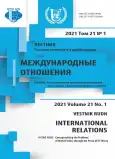Securitization Theory or a Well Overlooked Old: On the Philosophical and Theoretical Premises and Origins of the Theory
- 作者: Gaidaev O.S.1
-
隶属关系:
- St. Petersburg State University
- 期: 卷 21, 编号 1 (2021): Conceptualizing the Problems of World Politics through the Prism of IR Theory
- 页面: 20-32
- 栏目: THEMATIC DOSSIER
- URL: https://journal-vniispk.ru/2313-0660/article/view/320327
- DOI: https://doi.org/10.22363/2313-0660-2021-21-1-20-32
- ID: 320327
如何引用文章
全文:
详细
More than 20 years have passed since B. Buzan, O. Wæver and J. de Wilde published their “Security: A New Framework for Analysis”, which has become a classic in the discipline of security studies. Although Russian scholars increasingly attempt to use the securitization theory’s conceptual apparatus in their research, the knowledge of the theory itself remains rather fragmentary. The overwhelming majority of existing papers refer to the so-called Copenhagen School’s (CS) intellectual heritage, while more comprehensive approaches and recent studies remain almost unknown among Russian scholars. The author attempts to fill this gap. This article is first in line of a series of studies, entirely devoted to the phenomenon of securitization: from the earliest milestones to the modern stage of development of the theory. The paper examines the theoretical and philosophical premises, as well as the ideas and assumptions of the securitization theory, first formulated by O. Wæver in the late 1980s. The author refers to the original texts of the main figures of the CS: O. Wæver and B. Buzan, conceptualizing the history of the concept of securitization and immersing the reader into the atmosphere of security studies field at the end of the 20th century. As a result, it becomes possible to determine the key elements of the early theory of securitization: security as a speech act, national security as a main focus of study, post-structural realism as a research agenda of O. Wæver, and the idea of security as a negative meaning. The article concludes that despite the shortcomings of the early theory of securitization noted by many critics, it was based on a valuable and fruitful idea - an attempt to go beyond the notion of security as an absolute good or a metaphysical entity, which was typical of traditional and many alternative approaches to the definition of security.
作者简介
Oleg Gaidaev
St. Petersburg State University
编辑信件的主要联系方式.
Email: o.gaidaev@gmail.com
PhD Student, Department of Theory and History of International Relations
Saint-Petersburg, Russian Federation参考
- Arendt, H. (1972). Crises of the Republic: Lying in Politics, Civil Disobedience on Violence, Thoughts on Politics, and Revolution. New York: Harcourt Brace Jovanovich.
- Arendt, H. (2000). The Human Condition. St. Petersburg: Aleteiya publ. (In Russian).
- Austin, J.L. (1962). How to Do Things with Words: The William James Lectures Delivered at Harvard University in 1955. Oxford: Oxford University Press.
- Balzacq, T. (2011). A Theory of Securitization: Origins, Core Assumptions, and Variants. In T. Balzacq (Eds.), Securitization Theory: How Security Problems Emerge and Dissolve. Abingdon: Routledge (pp. 1—30).
- Buzan, B., & Hansen, L. (2009). The Evolution of International Security Studies. Cambridge: Cambridge University Press.
- Buzan, B., & Wæver, O. (1997). Slippery? Contradictory? Sociologically Untenable? The Copenhagen School Replies. Review of International Studies, (23), 241—250. doi: 10.1017/S0260210597002416
- Buzan, B. (1983). People, States and Fear: The National Security Problem in International Relations. Brighton: Wheatsheaf Books.
- Buzan, B. (1997). Rethinking Security after the Cold War. Cooperation and Conflict, 32(1), 5—28. doi: 10.1177/0010836797032001001
- Buzan, B., Waever, O., & de Wilde, J. (1998). Security: A New Framework for Analysis. London: Lynne Rienner Publishers.
- D’Entrèves, M.P. (1994). The Political Philosophy of Hannah Arendt. London: Routledge.
- Derrida, J. (2000). Writing and Difference. Мoscow: Akademicheskiy prospect publ. (In Russian).
- Eyvazov, J. (2017). Securitization and Regional Activity of a Major Power: The Case of Russia’s Policy during the Ukrainian Crisis. International Trends, 15(4), 156—173. (In Russian). doi: 10.17994/IT.2017.15.4.51.9
- Floyd, R. (2010). Security and the Environment: Securitisation Theory and US Environmental Security Policy. Cambridge: Cambridge University Press.
- Huysmans, J. (2002). Defining Social Constructivism in Security Studies: The Normative Dilemma of Writing Security. Alternatives, (27), 43—47. doi: 10.1177/03043754020270S104
- Konovalov, V.N., & Poghosyan, G.K. (2020). The Nagorno-Karabakh Conflict in the Context of Securitization Theory. Obshchestvo: Politika, Ekonomika, Pravo, 8(85), 13—17. (In Russian).
- Lomako, О.М. (2015). Social Philosophy of Hannah Arendt: Political and Ethic Aspects. Izvestiya of Saratov University. New Series. Series: Philosophy. Psychology. Pedagogy, 15(3), 21—25. (In Russian).
- Makarychev, A. (2008). Security and the Return of the Political: The Critical Debates in Europe. Security Index, 14(4), 25—40. (In Russian).
- Matalaeva, F.E. (2017). The Securitization of International Migration in Europe. Nauchno-analiticheskii zhurnal Obozrevatel’ — Observer, (2), 45—57. (In Russian).
- Morozov, V.E. (2011). Security as a Form of Political: On Securitization and Politicization. Polis. Political Research, (3), 24—35. (In Russian).
- Searle, J. (1965). What is a Speech Act? In M. Black (Eds.), Philosophy in America. Ithaca: Cornell University Press (pp. 221—239).
- Stritzel, H. (2007). Towards a Theory of Securitization: Copenhagen and Beyond. European Journal of International Relations, 13(3), 357—383.
- Vdovichenko, А.V. (2008). J. Austin’s “How To Do Things With Words” between Logic and Communication. St. Tikhon’s University Review. Series III: Philology, 1(11), 103—113. (In Russian).
- Wæver, O. (1989). Security, the Speech Act. Analyzing the Politics of a Word. Paper presented at the Research Training Seminar, Sostrup Manor, June. P. 1—68. URL: www.academia.edu/2237994/Security_the_Speech_Act_working_paper_1989 (accessed: 05.12.2020).
- Wæver, O. (2009). Waltz’s Theory of Theory. International Relations, (23), 201—222. doi: 10.1177/0047117809104635
- Wæver, O. (2010). Towards a Political Sociology of Security Studies. Security Dialogue, 41(6), 649—658. doi: 10.1177/0967010610388213
- Wæver, O. (2014). The Theory Act: Responsibility and Exactitude as Seen from Securitization. International Relations, 29(1), 121—127. doi: 10.1177/0047117814526606d
- Waltz, K.N. (1979). Theory of International Politics. Boston: Addison-Wesley Publishing.
补充文件









